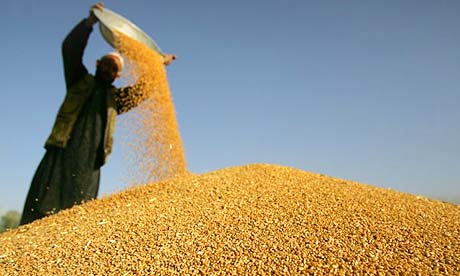Amount of Water It Takes to Produce Beef Vs Broccoli

Between 500 and 4,000 litres of water are required to produce 1kg of wheat according to a report into food wastage published today. Photograph: Ahmad Masood/Reuters
As much as 2bn tonnes of food are wasted every year - equivalent to 50% of all food produced - according to a report published today by the Institution of Mechanical Engineers (IME)
The IME estimate that 30-50% (1.2-2bn tonnes) of all food produced is "lost before reaching a human stomach". Consumer affairs correspondent Rebecca Smithers writes today:
The UK's Institution of Mechanical Engineers (IME) blames the "staggering" new figures in its analysis on unnecessarily strict sell-by dates, buy-one-get-one free and Western consumer demand for cosmetically perfect food, along with "poor engineering and agricultural practices", inadequate infrastructure and poor storage facilities.
Major supermarkets have also been blamed for food waste by rejecting crops of edible fruit and vegetables which don't meet their exacting standards for their physical characteristics (such as size and colour). Up to 30% of the UK's vegetable crop is never harvested due to this type of practice the report claims.
The publication entitled 'Global food: waste not, want not' also aims to highlight the wastage of energy, land and water. Approximately 3.8tn cubic metres of water is used by humans annually with 70% being consumed by the global agriculture sector. The amount of water wasted globally in growing crops that never reach the consumer is estimated at 550bn cubic metres.
IME claim that water requirements to meet food demand in 2050 could reach between 10-13.5tn cubic metres per year - about triple the current amount used annually by humans.
Meat production requires a much higher amount of water than vegetables. IME state that to produce 1kg of meat requires between 5,000 and 20,000 litres of water whereas to produce 1kg of wheat requires between 500 and 4,000 litres of water.
The table below shows typical values for the volume of water required to produce common foodstuffs. Chocolate tops the list with 17,196 litres of water need to produce 1kg of the product. Beef, sheep and pork meat all require high volumes of water for production also. Tea, beer and wine use the least according to the list. Compared to the production of meat, vegetable foodstuffs require considerably less water - 1kg of potatoes for example uses 287 litres of water.
Look at the table below to see how much water is required to produce a selection of common foodstuffs. Also if you want to see how much water we consume indirectly through eating and drinking different foods, we have previously published a great interactive visualisation by Italian graphic design specialist Angela Morelli.
What can you do with this data?
Data summary
Download the data
• DATA: download the full spreadsheet
SOURCES: Institution of Mechanical Engineers
NEW! Buy our book
• Facts are Sacred: the power of data (on Kindle)
More open data
Data journalism and data visualisations from the Guardian
World government data
• Search the world's government data with our gateway
Development and aid data
• Search the world's global development data with our gateway
Can you do something with this data?
• Flickr Please post your visualisations and mash-ups on our Flickr group
• Contact us at data@guardian.co.uk
• Get the A-Z of data
• More at the Datastore directory
• Follow us on Twitter
• Like us on Facebook
Source: https://www.theguardian.com/news/datablog/2013/jan/10/how-much-water-food-production-waste
0 Response to "Amount of Water It Takes to Produce Beef Vs Broccoli"
Post a Comment